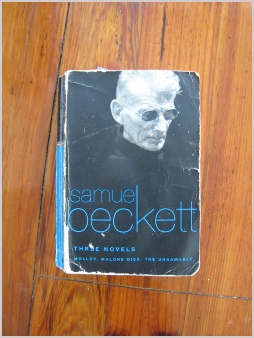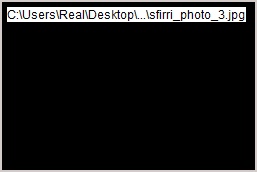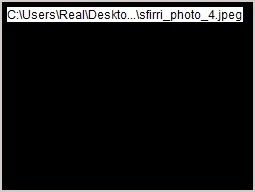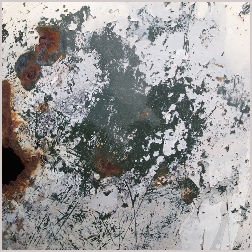Another Timbre TimHarrisonbre
Interview with Sam Sfirri
Can you tell us something about your background, and how you came to Wandelweiser?
My first memorable experiences with music were my mother singing to me at bedtime. She had more or less the same line-up of songs (Minnie the Moocher, I Get a Kick Out of You, among others). It was such an interesting experience because the song was complete in her voice. A detail of those early times is her frequent stopping in the middle of a verse due to allergies. That is an equally important part of the memory, the fragmentation of these melodies.
Sometime in early childhood I started taking piano lessons. In addition to practicing the material given by the teacher, I wrote pieces and improvised. Being a fairly timid musician, I felt most comfortable playing my material at night after my parents went to sleep, but did so at an extremely low volume because the piano was located directly under their bedroom. It was in these moments that the piano began revealing itself as something to investigate.
In the summer of 2008, after having looked at Michael Pisaro's Harmony Series scores, my roommate Jason Brogan and I flew out to Los Angeles to take part in the Dog Star Orchestra, a series of concerts organized by Michael in and around CalArts. Michael and his groups of friends, colleagues, and past students were such a cohesive group, not to mention beyond warm and welcoming. This was an important experience, seeing the working collection of people doing critical work together and with such frequency and care.
Later that year, Jason put on a series of concerts entitled Silent Music: 4' 33" and Beyond. He decided to programme me playing Radu Malfatti's Nonostante II which was somehow reminiscent of my first experiences with music.
Were you studying music at the time that you flew to California and met Michael Pisaro and the others?
I was on summer break between my Junior and Senior years at the College of Charleston, going for and later graduating with a degree in music. My focus was on theory/composition and jazz piano.
So what’s the extent of your formal musical training, and has it strongly shaped your current practice?
I continued to take piano/theory lessons on and off from childhood, having gained enough experience to convince the College of Charleston admissions committee that I was worth accepting. While a student there, the faculty sort of left me to my own devices, so long as I fulfilled the school's requirements. It might be worth mentioning that the jazz faculty regularly hired their students to play with them outside of the academic environment, which certainly blurred the lines between formal education and musical practice. On the whole, it was a nice experience that allowed me to meet some fantastic people and gave me some valuable insight towards approaching a musical situation.
After graduating I took part in two intensive periods of musical study: Ostrava Days 2009 and private study with Antoine Beuger.
The former was something like a two-year master's program condensed into three weeks. The festival consisted of lectures by famous musicians–Christian Wolff and Philip Thomas were decided highlights–interspersed with presentations by the students and days of performed music. It is worth noting that here I met two composers whose music I held in the highest regard for some years prior: Joseph Kudirka and Taylan Susam.
The latter was a singular experience of unbelievable clarity. Antoine Beuger's approach to music, as I would imagine his approach to everything, is with the sincerest humility. It would be hard to imagine that my thoughts on music from that time forward would and will be without him in mind.
Whether or not any of these experiences would be considered 'formal training', they have most certainly helped shape my current practice along with everything else that's happened in my life.
It sounds like a great training. Let’s move on to the ‘beckett pieces’, the series from which all your pieces on the ‘Wandelweiser und so weiter’ discs are taken. Can you tell us a bit about the series and how the scores work – and why Beckett?
The 'beckett pieces' were composed during a single two-year reading of Samuel Beckett's three novels: Molloy, Malone Dies, and The Unnamable. Each of the fifteen scores are titled with a fragment from Beckett's literature and feature notation consisting of two to six complete English sentences that do not break the default line of a standard word processor template.
Within each piece, the notation is split into two sections: non-italicized text and italicized text. The former lists the required materials while the latter demarcates the procedure of the piece.
"Why Beckett?" was never really a question I had in mind while working on these pieces. I suppose the simple answer would be that reading these novels opened a door for me to get some work done. During the reading, I generally made a piece per month, which gave me some time to think about and see the progress of the literature and the pieces as somehow in parallel. As I didn't know much about these novels before purchasing a copy–reasons being that we share the same first name and because he looks fantastic on the cover–the gradual dissolution of plot, character, and setting to just a voice unravelled as I read. So, the working question through the changing landscape–both literarily (in the text) and literally (in my surroundings)–was not so much "why Beckett?" but rather "how music?"
One thing that is in a way very ‘un-Beckett’ about the scores is how open they are. As a playwright Beckett was notoriously precise and exacting in ensuring that performers realised his works as closely as possible to how he wanted. You take a very different approach in the ‘beckett pieces’; while in most cases you offer some logistical instruction, the scores specify nothing in terms of instrumentation, pitch etc. So first of all, why do you choose to leave the scores so open – and is this part of your usual strategy in composition?
Yes, I've understood him to be extremely meticulous with performance directions in his playwriting. When writing these 'beckett pieces', this exacting was turned toward my reading of the these three novels, paying more attention to choosing the most appropriate fragments for titles and making the clearest possible instructions. The demands I set upon myself got rid of a lot of superfluous information in terms of notation, instrumentation and pitch being two examples. On the other hand, I feel as though the directions are extremely precise and do ensure that the performance is as close as possible to what I 'want'.
Of course, the sonic outcomes may vary considerably for each of the 'beckett pieces'. The recordings on Wandelweiser und so weiter are a testament to this fact and highlight some of the diverse avenues that performers have taken. From my experience as a performer, it is clear that the nature and use of notation in any score should be carefully observed when using that score as catalyst for performance. Any score is just as open as the next if you spend enough time with it.
The act of making a score is a performance in and of itself. However, the attributes of making this document and calling it a score is specifically about framing a potential future situation. My participation in this activity is about rules and boundaries set for myself. Beyond that I can't really say I have a usual strategy, especially with regards to how a performer should use the document as a score.
Yes, I think the scores have a deceptively simple appearance, but the fact that – in good hands at least - they seem to consistently produce good musical outcomes suggests that you’ve succeeded in distilling something significant into the words. Could you describe some of your more recent projects?
I've been fortunate to know Jason Brogan for some time now, and he's been active curating events all over the place, many of which I've been around to witness. Along these lines, I was a member of a very special ensemble including Jason, Tucker Dulin, Julia Holter, Andrew Lafkas, Katie Porter, and Ron Wiltrout performing songs from Michael Pisaro's Tombstones in early October at Issue Project Room. It looks as though there are promising plans to tour this material around the US and Europe this upcoming spring and summer. At the end of October, I took part in another project involving members of the New Music Collective–a local non-profit organization through which Jason, Ron Wiltrout, and I organize music events–as a guest ensemble for a John Cage centennial festival. Organized by pianist David Kalhous, the events took place around the Florida State University campus in Tallahassee, Florida, our involvement including performances and workshops of pieces by John Cage, Christian Wolff, Michael Pisaro, Manfred Werder, Antoine Beuger, and Eva-Maria Houben as well as assisting Mark So with a concurrent installation of his piece Into Silence and some of his recently made cassette tapes.
Extending further back in the year, I've organized a few performances of my own pieces from this and last year. One notable event was a performance of my Trio (2011) this past April 12–23 with Mitsuteru Takeuchi and Taylan Susam wherein we performed from our respective places of residence–Mitsuteru in Kobe, Japan; Taylan in Leuven, Belgium; myself in Charleston, South Carolina–with the simple instruction that we might use various instruments and documenting materials. Another notable event was an installation–with Jason Brogan's assistance–of a few copies of my October 30 (2012) piece around Charleston on the same date as indicated in the title.
I've also had the pleasure to work carefully with Stefan Thut on a recording project of his piece drei, 1–21. I understand that you are interviewing him as well, so I'll let him speak a bit more about this if he chooses.




Performing Michael Pisaro’s ‘Tombstones’ with Julia Holter
